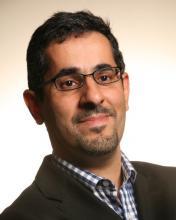
Clemson University's Ardalan Vahidi presented Optimal Coordination of Connected and Autonomous Cars in Smart Cities Nov. 3 at 4-5 pm in 290 Hearst Memorial Mining Building.
Abstract
Connectivity and autonomy of cars and roadside infrastructure is expected to transform urban transportation. For instance, cooperation between intelligent cars and intersection control units can harmonize traffic flow, increase energy efficiency, and enhance safety and passenger comfort.
This talk takes a closer look at some of these potentials. In one experimental case study, we demonstrate that coordination of movement of human-driven connected cars with traffic signals reduces idling and fuel consumption. In this case study we successfully “crowd-source” traffic signal timings from statistical patterns in motion of connected vehicles in the city of San Francisco. We also discuss the communication protocols and backend computing architecture that we have in place for collecting and processing vehicular data in near real-time and relaying the processed information to subscribing vehicles.
Benefits are expected to be higher with autonomous cars where absence of a human driver promises more predictability and precise control. In the second part of this talk, we formulate a novel intersection control concept for autonomous cars in smart cities that does not rely on conventional traffic signals. Arrivals of autonomous cars at the intersection are optimally scheduled to reduce delay. The benefits are shown in simulated scenarios and also in a vehicle-in-the-loop experiment.
Presenter
Ardalan Vahidi is a Professor of Mechanical Engineering at Clemson University, South Carolina. He received his Ph.D. in mechanical engineering from the University of Michigan, Ann Arbor, in 2005, M.Sc. in transportation safety from George Washington University, Washington, DC, in 2002, and B.S. and M.Sc. in civil engineering from Sharif University, Tehran in 1996 and 1998, respectively. In 2012–2013 he was a Visiting Scholar at the University of California, Berkeley. He has also held scientific visiting positions at BMW Technology Office in California, and at IFP Energies Nouvelles, in France. His research is at the intersection of energy, vehicular systems, and automatic control. His recent publications span topics in alternative vehicle powertrains, intelligent transportation systems, and connected and autonomous vehicle technologies.
